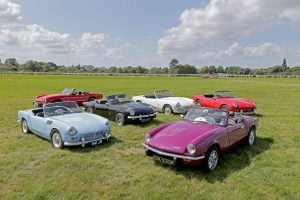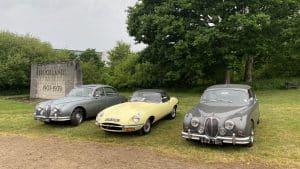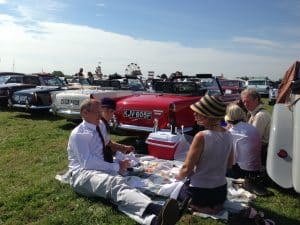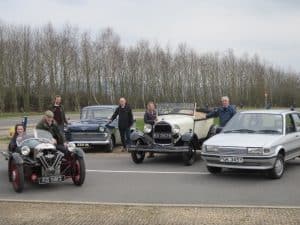Interest in classic cars has never been higher and the classic car scene has never been more exciting, diverse, and busy with a whole plethora of events and tours on offer. It’s a great community to be a part of and the reasons why you might want to dip your toe in are as many and varied as the number of cars on offer.
Getting started with Classic Cars
Many enter the world of classic cars because of nostalgia, buying the car they hankered after as a youth, or one that brings back memories of a dear family member or friend. Some were ‘doomed at birth’ having grown up in families dedicated to classic cars and the tight knit community around them. Recent research by the Federation of British Historic Vehicle Clubs revealed that many new owners buy a classic to enable them to go to certain events, tours or to access a particular lifestyle.
Then, there are those wishing to make an investment for financial return – we will not be covering that motivation within this series from Peter James Insurance, mainly because every classic car any of our team has ever bought has always ended up costing us money in the long run! Was it worth it? Yes of course! More on all that later in the series.
Whatever your reasons, there are a few things to consider when you are getting started with classic cars and beginning your journey before you even decide which car make and model you might start hunting for.

Choose with your heart!
Many ‘experts’ in bars and on social media might tell you what is or isn’t a ‘good’ car or a wise investment, but really you are about to be going through the good times and the bad times with your chosen classic and so it really needs to be a car you love, regardless of its apparent popularity with others. Don’t be afraid to be an individual and buy something that makes you tingle with excitement and look back over your shoulder at when you park it up!
Where will it live?
How much space do you have? Will it fit in your garage? Get your tape measure out and check these basic considerations first. Most classic car insurance policies, like ours here at Peter James, will provide an additional discount if your vehicle is garaged at night.
How many people will it need to carry?
Clearly if you have a family of four and you all want to go out and enjoy classic car events together, then it makes little sense to go and buy a classic car that’s small with only two seats. Pets are a consideration as well, although we have seen a Wolfhound in an MG Midget before now and Dave Youngs, Peter James Partnerships Director, regularly carried his Boxer, Moose, in his Mk1 MX5! The serious point is that, by buying a practical classic, you are more likely to use it, create memories and enjoyment and then feel like it has all been worthwhile in the long run.

Setting a budget
Classic car prices can vary according to desirability, rarity, historic significance, colour, and desirability. Whether they have been recently restored or not also has a bearing as does originality – and you might be surprised to learn that the more basic and closer to factory stock a car is, the more it is often worth, especially for unrestored examples in good condition.
The main thing to do when getting started with classic cars and setting your budget is to give yourself ‘headroom’ for unexpected maintenance, repairs, and upgrades further down the line. Try not to max yourself out on the purchase and have nothing left in the pot for all the extra stuff you must buy to service it, like tools, parts, and consumables. This advice, however, is easier said than done!
A common phrase used in advising first time buyers is to “buy the best you can afford” which is sometimes difficult to quantify. But fundamentally, it means that you shouldn’t be tempted for a cheaper car than you can afford that is rough around the edges, just because it seems like a steal. We promise you it will always cost more in the long run!
We will cover more buying tips in detail, later in the series.

Consider the availability and cost of parts and consumables
Running a classic car is straightforward, but if parts are difficult or prohibitively expensive to obtain, then it can easily test your enthusiasm when the car is rendered motionless for weeks on end whilst you track that elusive component down. When you’re just getting started with classic cars – clubs and the classic motoring press are a great resource for this.
Most vehicles, particularly British classics, usually have a good supply of parts and an active club community involved in sourcing them or even in some cases, remanufacturing them. There are many friendly specialist suppliers as well and the internet auction sites also provide a valuable resource for tracking down parts from obscure sources.

Older vehicles are simpler in their construction and therefore easier to maintain and service. You might be surprised at how affordable some classic cars are to run, but again do your research before you purchase to look at typical running costs and service items such as tyres, filters, lubricants and frequently required parts.
Other running costs?
Classic cars older than 40 years old do not need to pay road tax. They are also exempt from compulsory MOTs – but we recommend getting a professional to check your classic over at least once a year to ensure it is in good roadworthy condition.
Join a classic car club
Another top tip for getting started with classic cars…Clubs are the lifeblood of the classic car community. Not only do they supply a useful support network of expertise, parts supply, and events but they can also help you find the right car as well. A common mistake is to wait until you have a car and then join the club associated with it.
Instead, as soon as you have your heart set on a particular make and model and you have done all the other checks and research outlined here, then join the club right away and make it known that you are in the market. Attend meets, events and local gatherings and seek expertise and the inside track on cars that might be for sale. Check the classifieds in the club magazines and online forums.
Many helpful club members will often offer to come and view a car with you to give an experienced and objective opinion on its true value and condition.
A great source of information on clubs and what they can offer can be found through the Federation of British Historic Vehicle Clubs (FBHVC).

Are classic cars harmful to the environment?
Despite the endless flow of fake news and propaganda on social media and in the press, the fact remains that a motor car consumes more resources during its manufacture than at any point in its many years of service. In that sense, classic cars have paid their dues and rather than waste the precious resources by scrapping them – we keep them going and preserve our motoring heritage. Classic car ownership is, frankly, the sexiest form of ‘make do and mend’ you will find!
Overall, the number of miles covered by the entire historic vehicle movement, including steam powered vehicles, lorries, buses, and motorcycles equates to less than a quarter of one percent of the total miles travelled on UK roads.
For those are keen on ensuring that their classic car is having zero impact on the carbon output into the environment, then why not consider signing up to the Federation’s Carbon Offsetting Scheme supplied in conjunction with Tree-V. Quite simply you buy credits for the number of miles you intend to travel according to the type of vehicle you are driving and Tree-V plant trees to offset the carbon.
What about new E10 fuel?
Ethanol in fuel is here to stay and many classics can run quite happily on E10 (10% ethanol), after having had certain components upgraded in their fuel system. Furthermore, the provision of E5 fuel has been secured in law by the FBHVC and will remain on forecourts as Super grade fuel for the foreseeable future. The FBHVC offer lots of useful information on adapting to run on modern fuels: www.fbhvc.co.uk/fuels.
Can young people get into classic cars?
There is a strong movement within the classic car community at present, led by clubs and industry alike, to encourage young people into classic cars of all ages.
Gone are the days when classic cars were considered the preserve of the elderly bearded anorak in a pub! Nowadays classic cars are seen as a statement of individuality, a way of expressing oneself and a way of gaining access to an incredibly friendly and supportive community. Have you noticed how many music videos, adverts and TV shows now feature classic cars? It’s true – they are officially cool!
Most car clubs will have a section or group for younger members, so enquire as to who to get in touch with if you are a younger, potential owner.
Peter James Insurance support young drivers through supplying insurance cover through club membership at favourable rates. So, if your chosen club is a partner of ours, then it’s highly likely we can provide cover for younger members too!
If you’re getting started with classic cars and have had little access to classic cars in the past, then why not check out the classic car loan project which offers young people the opportunity to ‘borrow’ a classic car for a year. A mentor oversees the experience and offers guidance where possible and insurance is taken care of by us here at Peter James. Click here to find out more.

Restore or buy ready finished?
This really comes down to budget, experience and access to facilities and tools. It is rarely cheaper to buy a restoration project than it is to buy a finished classic car that is ready for the road, unless you can do most of the work yourself. It is possible to restore a classic car on a limited budget with basic facilities if you are of a practical disposition. Certainly, the satisfaction that comes from a restoration is second to none, but if you would rather have a working car that you can instantly enjoy and lightly improve along the way, then be honest with yourself from the outset and buy accordingly.
What about insurance?
Statistics show that classic cars are less likely to be involved in accidents and cover relatively limited mileages each year in comparison to modern vehicles in daily use. So, overall you may be surprised at how affordable classic car insurance is. You should only consider a specialist classic car policy and for more details on why that is important, then you can read our guide here.
Check your insurance quotes as you go
As you start to weigh up the various classic car makes and models that you might like to own within your price range, you can easily check potential insurance costs using the Peter James Quick Quote tool.
Stay tuned!
We will continue our mini-series for beginners looking to get into classic cars next month where we will look at the sort of events, trips and tours you can get involved with and how what appeals to you might affect the type of classic car you choose. We will also share some basic buying tips for when the research ends, and the car viewing begins. All to come from Peter James Insurance to follow our social media streams to keep updated with new content as we publish it!


